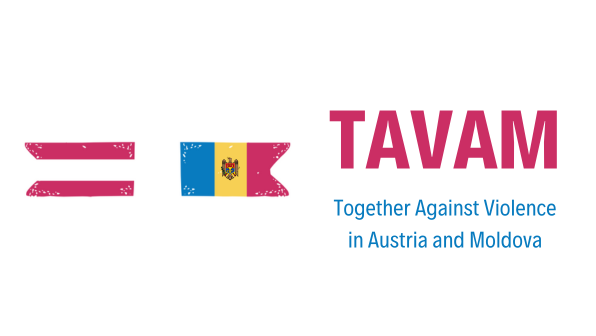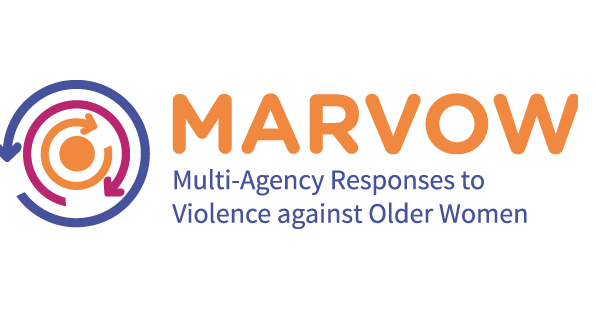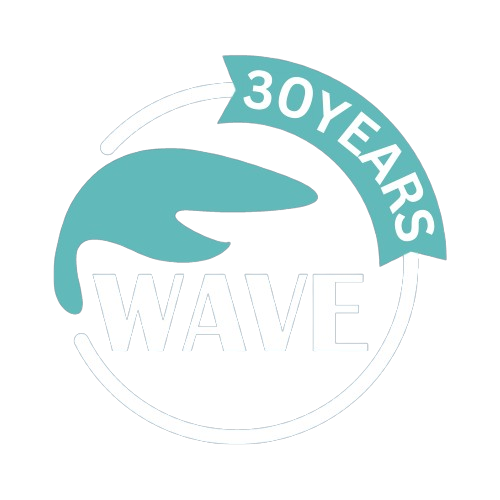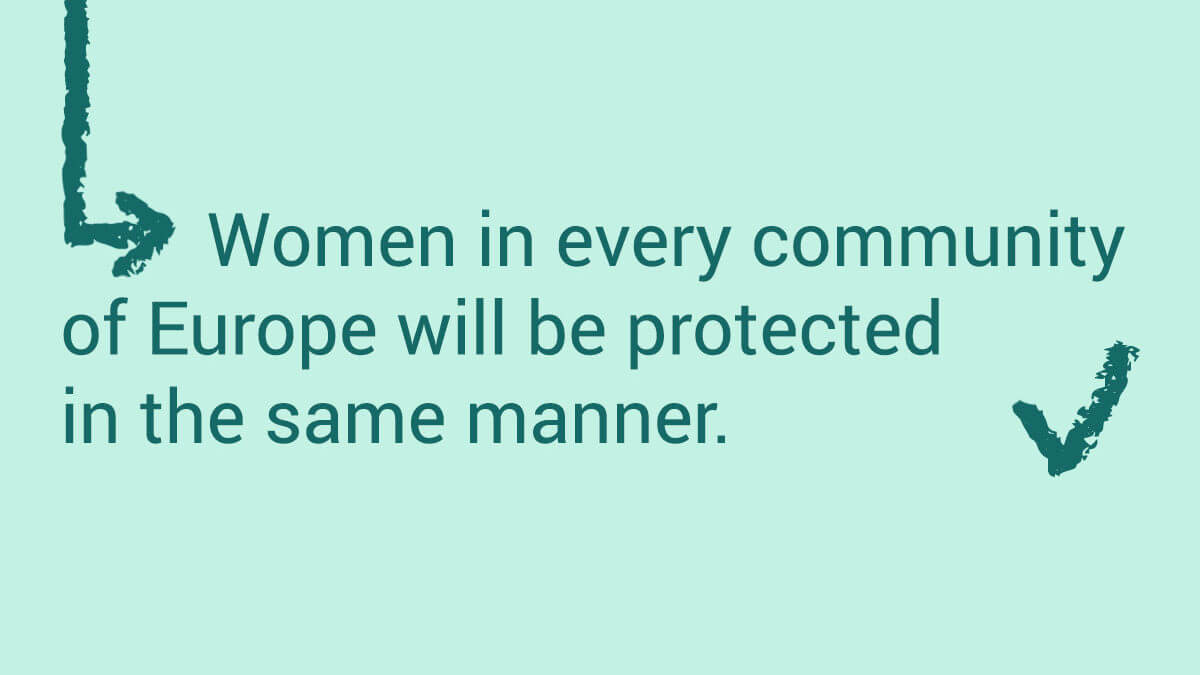WAVE’s core work consists of the following three areas:

Capacity Building
Through trainings, mutual learning exchanges, webinars, study visits, conferences and partnership projects, we are strengthening the capacities of our members so they can support women and children to live free from violence.

Advocacy
We advocate and campaign for better legislation and implementation of existing legislation to tackle violence against women and for sufficient funding for women’s specialist services.

Research
Through data collection and analysis about women’s specialist support services in 46 countries, we identify gaps and barriers in support services and the implementation of the Istanbul Convention.
Projects
In addition to the core work, WAVE partners regulary with members in European and international projects.

Preventing and responding to gender-based violence during the war and in post-war settings
WAVE launched a new project in collaboration with OSCE to improve the support survivors of violence and civil society organizations (CSOs) in conflict and post-conflict areas.

Safeguarding and Empowering Children
The project “Safeguarding and Empowering Children” aims to secure that children are safe and can thrive whilst their mothers get supported by women’s specialist services and once they are ready to move on to a new life.

TAVAM – Together Against Violence in Austria and Moldova
This project aims to strengthen the capacity of Moldovan women’s specialist services and to advance the transfer of knowledge between Austrian and Moldovan organisations.

VIPROM – Victim Protection in Medicine
This project aims to provide sustainable, organisationally embedded, and institutionally recognised training tailored to the specific needs of various medical professionals from different medical fields.

MARVOW
Abuse of older women is perhaps the most underdeveloped of all aspects of support services for gender-based violence in Europe. The MARVOW project develops and implements a multiagency cooperation model for working with elderly victims of abuse.
FAQ
What is WAVE?
WAVE stands for Women against Violence Europe and is a non-profit, non-governmental feminist women’s organization working in the area of combating violence against women. Established in 1994, WAVE is a network organization composed of more than 160 women’s organizations in 46 European countries. A few members of WAVE represent governmental organizations. WAVE’s central office is located in Vienna, Austria. WAVE aims at establishing gender equality by working towards the elimination of all forms of violence against women and is the only network dedicated solely to work against violence against women.
How did WAVE get started?
WAVE was established in 1994. The original idea to found the network can be traced back to a number of international events.
It all began in 1993
The widening of transnational cooperation began with the World Conference on Human Rights held in Vienna in 1993. This conference established that acts of violence committed against women constituted human rights violations. These violations related to the violation of right to live a life free from violence and the right to freedom from fear and coercion. The conference’s final document, the Vienna Declaration defines violence against women as a human rights violation and calls on states to take steps to prevent it. This success must be attributed to the active role which international women’s organizations played in the conference. One of the most important events of the conference agenda was the ‘Global Tribunal for Women’s Human Rights’. For a full day, women reported on their experiences of violence to government delegates and to international committee of experts. Following the conference, in December 1993, the United Nations General Assembly adopted the Declaration on the Elimination of Violence against Women. In the spring of 1994, the post of Special Rapporteur on Violence against Women was established at the Human Rights Commission in Geneva. Radhika Coomaraswamy from Sri Lanka was appointed to the post.
WAVE is established in 1994
In October 1994 the European and North American Preparatory meeting for the 4th United Nations Conference on Women (Beijing, 1995) took place in Vienna. European NGOs working in the field of violence against women took an active part in the conference, setting up a working group on ‘Violence and Human Rights Violations against Women’. It was during the meeting that a group of women working in women’s shelters and organizations working at combating violence put forward the idea of establishing a European network on violence against women, as means of strengthening the feminist movement across Europe. This was believed to enable women’s organizations to collaborate and cooperate, to gain more influence and to more effectively fight for women’s rights and to promote the prevention and combating of violence against women on a European level.
WAVE and the 4th United Nations World Conference on Women in 1995
In the course of the 4th United Nations World Conference on Women, held in Beijing in September 1995, progress was made in the formation of the European network. Its initiators ran a working group under the support of the NGO Forum, thus giving a wide public access to information on this undertaking.
The World Conference on Women marked a further step in combating violence against women. Measures against violence constituted one of the priorities in the Action Platform, the final document of the World Conference on Women. It contains a large number of recommendations and measures to prevent violence to be implemented by the member states. In the course of the World Conference on Women, the WAVE founding group held its constituent session. The group’s members included: Niamh Wilson of Irish Women’s Aid, Ebon Kram of the Swedish Women’s Shelters Network ROKS, Urszula Nowakowska of the Centrum Praw Kobiet (Women’s Rights Centre) in Warsaw, Marianne Cense of TransAct in the Netherlands, Lepa Mladjenovic of the SOS Hotline in Belgrade, and Rosa Logar of the Verein der Autonomen Österreichischen Frauenhäuser (Austrian Women’s Shelter Network).
First network working session in 1996
The first working session of the WAVE founding members took place in Utrecht, Netherlands in October 1996. The meeting was financed by the participants themselves and/or their organizations. The agenda covered an initial definition of the network’s objectives and working principles, a discussion of goals and sources of funding, and an organization of a European-level WAVE conference. At the beginning, the network was referred to as the Information Centre against Violence. The Eastern European delegates expressed their desire to form an Eastern European women’s projects against violence within the WAVE Network to serve the purpose of networking, because the background conditions and structures pertaining to their work differed markedly from those relating to the work of women’s organisations in Western Europe.
The international conference on ‘Women, Violence and Citizenship’
WAVE made an active contribution to the international conference on ‘Women, Violence and Citizenship’, held in Brighton, United Kingdom, in November 1996. During the conference, WAVE organized two working groups with an emphasis on introducing and enlarging the network, and additionally distributed its first folder and sought organisations to join the network.
Information meeting for WAVE members and international delegates
The first meeting took place in Vienna at the Intervention Centre against Domestic Violence on the 4th of December 1996.
First European ‘Daphne’ Project in 1997
The Vienna Information Centre against Violence assumed much of the responsibility for the network’s coordination and set about raising funds. Following the ‘4th World Conference on Women’ in Beijing in 1995, the European Commission began the ‘Daphne’ Initiative, supporting transnational projects aimed at preventing and combating violence against women and children. The WAVE Network successfully applied for funding and on the premises of the Information Office against Violence in Vienna, the WAVE coordination office was set up. The first WAVE conference took place in the year 1997 in Belgrade, Serbia.
Since 1997, WAVE’s work has been continuously supported through funding by the European Commission. In 2014, WAVE celebrated its 20 year anniversary. Our work continues and we feel great privilege to be able to continue this important work.
Who are WAVE’s members?
The Network comprises of more than 160 women’s organizations in 46 European countries. The members serve as a source of information about violence against women and children in their respective countries, facilitating the exchange of ideas and dissemination of information about domestic and sexual violence throughout Europe. Many WAVE members participate in WAVE activities and projects, including the Annual WAVE Conference, WAVE Training Institute, WAVE magazine FEMPOWER, and Annual WAVE Country Report by serving as expert sources of primary information for their countries in the field of violence against women and children. Additionally, many individual WAVE projects outside of WAVE’s yearly operational activities involve WAVE members as partners. The work done within the Network contributes to the implementation of new ideas gained through the exchange of information and ideas between these organizations.
How can I become a WAVE member?
If you are interested in becoming a WAVE Member, here are the steps to follow to become a member of the WAVE Network!
- Please contact the WAVE Office, with a membership request at office@wave-network.org.
- Following your request you will be asked, to fill out a short questionnaire about your person/your organization (i.e. aims and objectives, activities carried out).
- The information received will be distributed to the existing WAVE Members, who have the right to comment on the application. Based on their comments, and on the WAVE Statutes, the WAVE office will submit the application to the WAVE Board, who has final decision rights.
- If your application is successful, you will receive an e-mail from the WAVE Office, along with an official confirmation letter, which should be signed and returned to the WAVE Office.
How can I get help if I am experiencing violence?
It takes a lot of courage to reach out for help. WAVE can help by providing referrals to relevant services in your country and try to support you the best we can.
If you wish to look for support services in your country, you can search our database for specific services here.
If you wish, you may contact a WAVE member organization in your country that works in the area of preventing and combating violence against women. For a list of organizations, please click here.
Should you wish to contact the WAVE office directly, please send us an e-mail to office@wave-network.org or contact us at +43 (0) 1 548 2720. Additionally, we are available via fax, on Facebook, Twitter and Instagram.
Someone I know is experiencing violence. How can I help?
Supporting a person who is going through violence can be challenging.
Here are several things to keep in mind:
• Domestic violence is a very common crime
• BUT every person has the right to live a life free of violence and abuse
• AND the abuser is always the person responsible for the violence – violence is NEVER a legitimate response
For further advice, feel free to check out the following links:
• www.womensaid.ie/help/someoneyouknow.html
• www.nationaldomesticviolencehelpline.org.uk/support-a-friend-or-family-member-experiencing-domestic-violence.aspx
• www.dvrcv.org.au/help-advice/guide-for-families-friends-and-neighbours
• http://everydayfeminism.com/2014/01/how-to-help-a-loved-one-experiencing-domestic-violence
• www.loveisrespect.org/for-someone-else/help-a-friend
Should you wish to contact the WAVE office directly, please send us an e-mail to office@wave-network.org or contact us at +43 (0) 1 548 2720. Additionally, we are available on Facebook, Twitter and Instagram.







